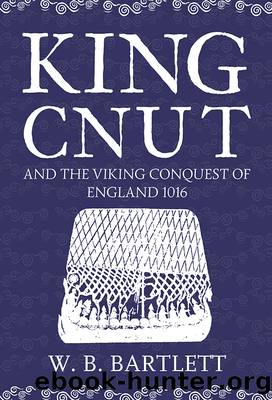King Cnut and the Viking Conquest of England 1016 by W. B. Bartlett

Author:W. B. Bartlett
Language: eng
Format: epub
Publisher: Amberley Publishing
Published: 2016-09-20T16:00:00+00:00
5
King of England: Victory and Kingship (1016â1018)
So now feng Cnut cyning to eall Angelcynnes rice: âKing Cnut succeeded to all the kingdom of Englandâ. âCyningâ â âkingâ â was itself an interesting word. Its root was âcynnâ â âkinâ or âpeopleâ â and the king was their leader, the keeper and protector of their treasure and their defender. It was a position that of course came with great power and wealth but also great responsibility.
Cnut now had the crown of England to himself, with his greatest rival, the resilient Edmund, out of the way permanently. It was suggested by the later chronicler âFlorenceâ of Worcester that Edmund had said that he wanted the crown to go to Cnut if he were to die in order that his children would be protected,1 giving the Dane a convenient excuse to take over Wessex as well as the rest of the country. In any event, the very young children of Edmund would not be a threat to Cnut for many years and the Ãtheling offspring of Ãthelred and Emma, Edward and Alfred, were far removed from the centre of events. Cnut now had no opponents.
It might seem strange that Edmund had declared that Cnut should be his successor if he died but such a deal was not unique. Two decades or so later, Cnutâs son and heir Harthacnut would strike a deal with his great rival Magnus of Norway that, whoever died first, the survivor should succeed to all the lands held by the other. Even in later times we find Charles VI of France agreeing with Henry V, the victor of Agincourt, that on his death the English king should succeed to his crown. Such an arrangement was a way for Edmund to hold on to power whilst he lived, and who knew anyway what might have happened before his death?
England was tired of incessant warfare and hardship. The Anglo-Saxon Chronicles talk so repeatedly of death and destruction in the three decades leading up to this moment that the reader can become almost blasé about it. However much repetition might make one immune to the horrors of this period, it is important to remind oneself that repetition does not necessarily equate to exaggeration. From what we can gather these were years and decades of terrifying raiding, extortionate taxation and general misery. In all probability some of the English at least were just happy that the fighting was over for a time. But at the same time there must surely have been nervousness now that the throne was in the hands of a Dane.
Much was expected from a king of the times, though he got much back in return. The ideal king was required to deal out justice equitably (as defined by the law) but firmly. He should be a conqueror in battle for if he were not then he had forfeited the favour of God. He should be a protector of the rights of men â and most particularly the Church. In return, the Church would encourage the kingâs subjects to be loyal to their true lord.
Download
This site does not store any files on its server. We only index and link to content provided by other sites. Please contact the content providers to delete copyright contents if any and email us, we'll remove relevant links or contents immediately.
Room 212 by Kate Stewart(5087)
The Crown by Robert Lacey(4783)
Endurance: Shackleton's Incredible Voyage by Alfred Lansing(4741)
The Iron Duke by The Iron Duke(4333)
The Rape of Nanking by Iris Chang(4188)
Joan of Arc by Mary Gordon(4076)
Killing England by Bill O'Reilly(3986)
Say Nothing by Patrick Radden Keefe(3963)
I'll Give You the Sun by Jandy Nelson(3413)
Shadow of Night by Deborah Harkness(3337)
Hitler's Monsters by Eric Kurlander(3313)
Mary, Queen of Scots, and the Murder of Lord Darnley by Alison Weir(3188)
Blood and Sand by Alex Von Tunzelmann(3179)
Eleanor & Park by Rainbow Rowell(3138)
Darkest Hour by Anthony McCarten(3111)
Margaret Thatcher: The Autobiography by Thatcher Margaret(3063)
Book of Life by Deborah Harkness(2911)
Red Famine: Stalin's War on Ukraine by Anne Applebaum(2908)
The One Memory of Flora Banks by Emily Barr(2846)
